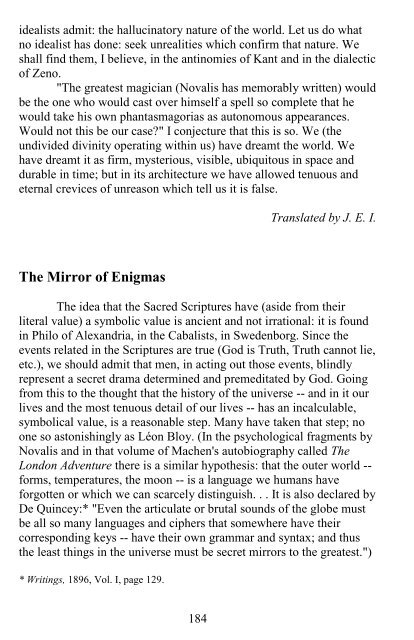Jorge Luis Borges - Labyrinths
Jorge Luis Borges - Labyrinths
Jorge Luis Borges - Labyrinths
You also want an ePaper? Increase the reach of your titles
YUMPU automatically turns print PDFs into web optimized ePapers that Google loves.
idealists admit: the hallucinatory nature of the world. Let us do what<br />
no idealist has done: seek unrealities which confirm that nature. We<br />
shall find them, I believe, in the antinomies of Kant and in the dialectic<br />
of Zeno.<br />
"The greatest magician (Novalis has memorably written) would<br />
be the one who would cast over himself a spell so complete that he<br />
would take his own phantasmagorias as autonomous appearances.<br />
Would not this be our case" I conjecture that this is so. We (the<br />
undivided divinity operating within us) have dreamt the world. We<br />
have dreamt it as firm, mysterious, visible, ubiquitous in space and<br />
durable in time; but in its architecture we have allowed tenuous and<br />
eternal crevices of unreason which tell us it is false.<br />
Translated by J. E. I.<br />
The Mirror of Enigmas<br />
The idea that the Sacred Scriptures have (aside from their<br />
literal value) a symbolic value is ancient and not irrational: it is found<br />
in Philo of Alexandria, in the Cabalists, in Swedenborg. Since the<br />
events related in the Scriptures are true (God is Truth, Truth cannot lie,<br />
etc.), we should admit that men, in acting out those events, blindly<br />
represent a secret drama determined and premeditated by God. Going<br />
from this to the thought that the history of the universe -- and in it our<br />
lives and the most tenuous detail of our lives -- has an incalculable,<br />
symbolical value, is a reasonable step. Many have taken that step; no<br />
one so astonishingly as Léon Bloy. (In the psychological fragments by<br />
Novalis and in that volume of Machen's autobiography called The<br />
London Adventure there is a similar hypothesis: that the outer world --<br />
forms, temperatures, the moon -- is a language we humans have<br />
forgotten or which we can scarcely distinguish. . . It is also declared by<br />
De Quincey:* "Even the articulate or brutal sounds of the globe must<br />
be all so many languages and ciphers that somewhere have their<br />
corresponding keys -- have their own grammar and syntax; and thus<br />
the least things in the universe must be secret mirrors to the greatest.")<br />
* Writings, 1896, Vol. I, page 129.<br />
184


